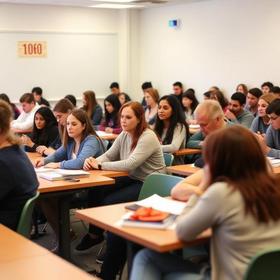With an economy – and numerous industries – that have apparently gone south, many are hopping on the continuing education bandwagon to obtain training in more lucrative professions. However, the increased demand for higher education has led to longer waiting lists for the required courses to complete degrees. This is particularly true at community colleges, where many adult students turn to shift career gears. Has this glut in higher education resulted in a black market for popular classes?
A recent advertisement on Craigslist may indicate that a black market for college classes is thriving, at least at Columbia Basin College in Washington. According to an article on Inside Higher Ed, the ad read as follows: "So I heard that some people are registering for classes that are in high demand to sell their spots in them, and Biology 160 is one of those classes. My roommate and I need into that class summer quarter, so if anyone is currently enrolled in any of the Bio 160 classes for SUMMER QUARTER and is willing to sell their spot on it or knows anyone who is, please, please, please let me know ASAP."
The sender of the email ad has been conspicuously anonymous throughout, refusing to respond to email messages from Inside Higher Ed. The posting was removed a few days later, and no one knows if a spot in the course was actually sold. Some doubt the legitimacy of the request and believe the posting was done to draw attention to recent class developments at the college. Gwendolyn James, an assistant professor of English at Columbia Basin, told Inside Higher Ed., "I suspect the Craigslist ad was probably generated by someone hoping to spawn some public outrage over the class cuts at CBC."
This video offers an overview of community colleges in Tennessee.
Is a Black Market Possible?
The problem is that a black market for classes is a viable possibility at Columbia Basin and other community colleges across the country. Some colleges, like CBC, have done away with waiting lists for courses because the long lists became difficult to manage through the registration system. Students can only get into a class that has reached capacity when someone drops the course online. When the opening arises, another student can immediately pick it up.
Some classes are in particularly high demand because they are part of the required sequences for various degree programs. For example, the Biology 160 class listed above is required for health profession programs like nursing, dental hygiene, paramedic training, and physical and occupational therapy. These programs are currently in high demand because the job prospects after graduation are better than other types of degrees.
This video offers and overview of community colleges in Montana.
A Widespread Problem
Part of the competition for courses stems from the fact that more students are entering community colleges today. A sluggish economy has led many to search of re-training options, and many students who cannot currently afford a four-year education are turning to community colleges to jumpstart their higher education plans. An article on KPBS at San Diego State University reports that thousands are on the waiting lists for classes at California community colleges because demand is up and course offerings are down due to budget constraints.
Community College Chancellor Jack Scott told KPBS, "We've got far more students that want into our classes than we have space. So the demand is extremely high. The supply is limited." Scott added that around 140,000 students were turned away from community colleges because classes were unavailable. First-time students are among those hit hardest by the class shortage because they are at the bottom of the priority list when it comes to registering for classes.
A report at the South Bend Tribune states that summer enrollments are also up at community colleges in Michigan and Indiana. Enrollment has increased by 23% for Southwestern Michigan College's spring-summer semester, and Ivy Tech in Indiana has been seeing enrollment increases for years. The current summer enrollment at Ivy Tech boasts a 17.2% increase from last year.
Class shortages are sure to lead to frustration among college students who are anxious to finish their degree programs and get their feet back into the workforce as quickly as possible. But would their frustration lead to black market sales of course enrollments? Barmak Nassirian, associate executive director of the American Association of Collegiate Registrars and Admission Officers, told Inside Higher Ed that he wouldn't be completely surprised at the possibility.
"This is proof that rationing naturally creates a black market for the thing rationed," Nassirian said.















